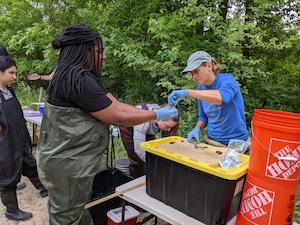A team of five that includes a female University of Florida professor as its lead scientist will embark Thursday on a dangerous trek across the Florida Everglades to assess the impact of humans on the world’s largest subtropical wilderness. The group will retrace an 1897 canoe journey that was first completed by explorer and scientist Hugh de Laussat Willoughby.
Tracie Baker, an associate professor of environmental and global health in the UF College of Public Health and Health Professions, has joined the team of experienced explorers and guides in a mission to sample and test for the same water constituents that Willoughby did more than a century ago. Willoughby’s charts aided in creating the first accurate maps of the region, and his water sampling provided the baseline water chemistry for the Everglades.
“This expedition is primarily focused on applying modern scientific investigations to one of the planet’s most important watersheds. However, we also hope to inspire future generations of scientists, explorers and all citizens to be better stewards of our shared environment,” said Baker, a member of the UF Water Institute. “My work focuses on multidisciplinary research that seeks to bridge and improve human, animal and environmental health. The Willoughby Expedition will provide critical primary research into that work.”

On the right, UF Professor Tracie Baker, DVM, PhD, works in the field with colleagues and students
To gauge humanity’s impact on the Florida Everglades, a UNESCO Wetland Area of Global Importance, the 2022 Willoughby Expedition team will also look for water pollutants that Willoughby couldn’t have foreseen, including microplastics, perfluoroalkyl and polyfluoroalkyl substances (PFAS), pesticides, pharmaceuticals and antibiotic-resistant genes, all of which are adversely affecting plant and animal species globally. To help conserve wildlife, the expedition team will also document the abundance and location of apple snails, which are the sole food source of the federally endangered snail kite, a bird of prey.
Starting at the mouth of the Harney River in the Gulf of Mexico on Oct. 27, and ending in downtown Miami in early November, the coast-to-coast expedition commemorates the 75th anniversary of Everglades National Park. It will traverse the saltwater of the Gulf of Mexico, the brackish water of inland rivers, pristine freshwater sawgrass, canals in suburban Miami, and ultimately, through a maze of skyscrapers to Biscayne Bay.
The Florida Everglades is one of the world’s best-known and most visited watersheds, serving as the “environmental kidneys” of Florida by filtering and cleaning water from all over the central and southern part of the state. Its water quality directly impacts more than 12 million people and thousands of plant and animal species.
Historically, the Florida Everglades stretched from the north near modern-day Orlando to the south at Florida Bay. Willoughby completed his studies of the Everglades before large-scale drainage and reclamation programs began in the late 19th century. Today, the Everglades has been reduced to approximately one-third its original size to make way for the modern cities of South Florida and their millions of residents.
The 2022 Willoughby Expedition will bring awareness to the major scientific and conservation goals of its more than 50 partners, including the University of Florida, National Park Service, Everglades National Park, Florida Power & Light Company, South Florida Water Management District, Marine Industries Association of Palm Beach County, Palm Beach International Boat Show, and Cox Science Center and Aquarium.
To increase educational programming around human impact on the Everglades, the 2022 Willoughby Expedition is also partnering with school districts and cultural institutions in South Florida. Live feeds from the Everglades will be shared with schools and science museums, allowing students, educators, and museumgoers to interact directly with the expedition team.
“Public education and the live broadcasts are some of the most exciting and important aspects of the expedition,” said Harvey E. Oyer III, the 2022 Willoughby Expedition’s co-leader, who is also an author, archaeologist, fifth-generation Floridian, and former U.S. Marine Corps captain. “We want to share our passion for the natural world by giving the public an inside look at our work and igniting their passion to preserve the natural world.”
The Willoughby Expedition team includes:
Support team members include three other scientists, a chemist, a pilot and a filmmaker.
To learn more about the team, the course, the science, and the man who inspired it all, visit willoughbyexpedition.org.